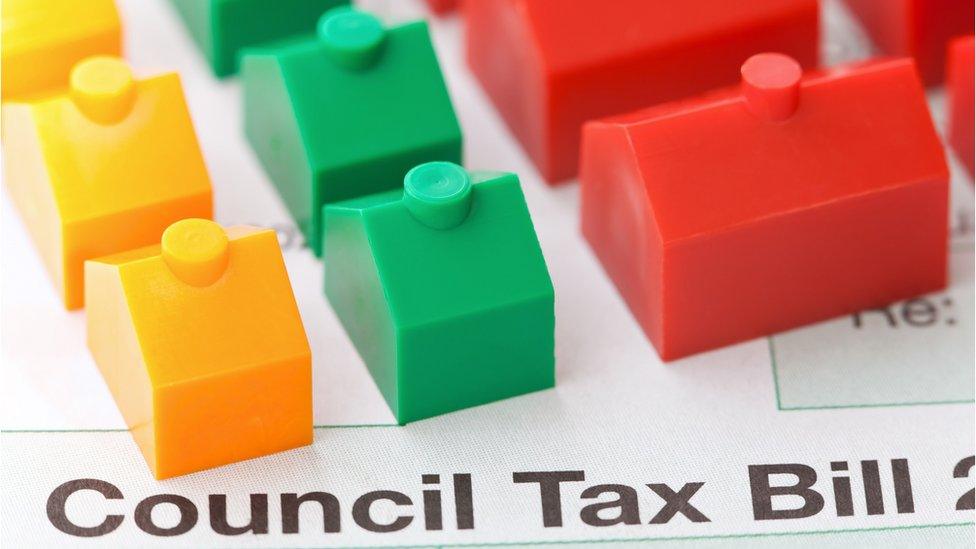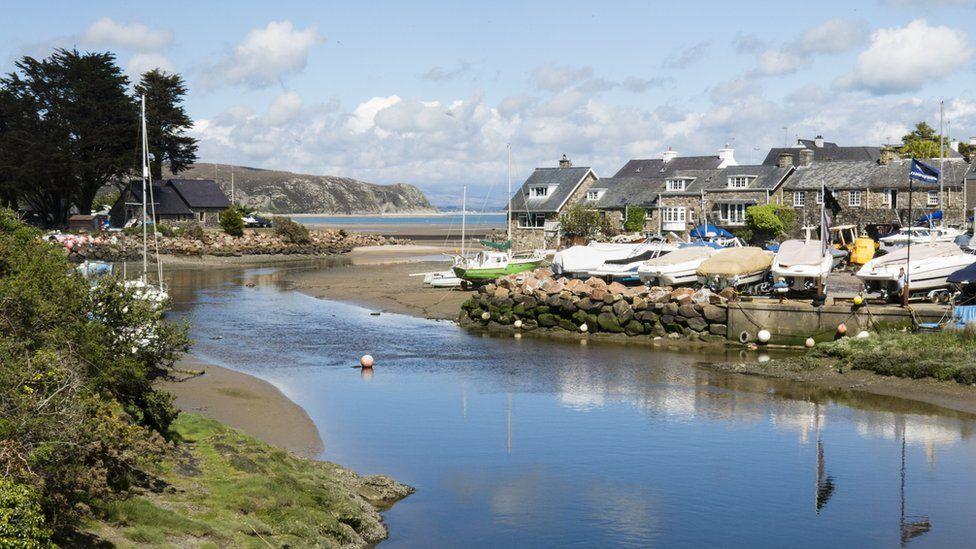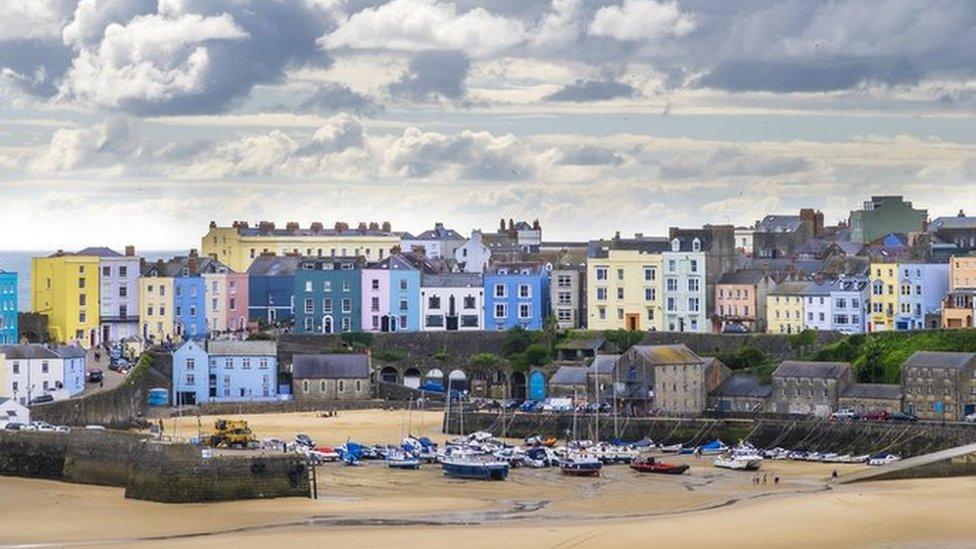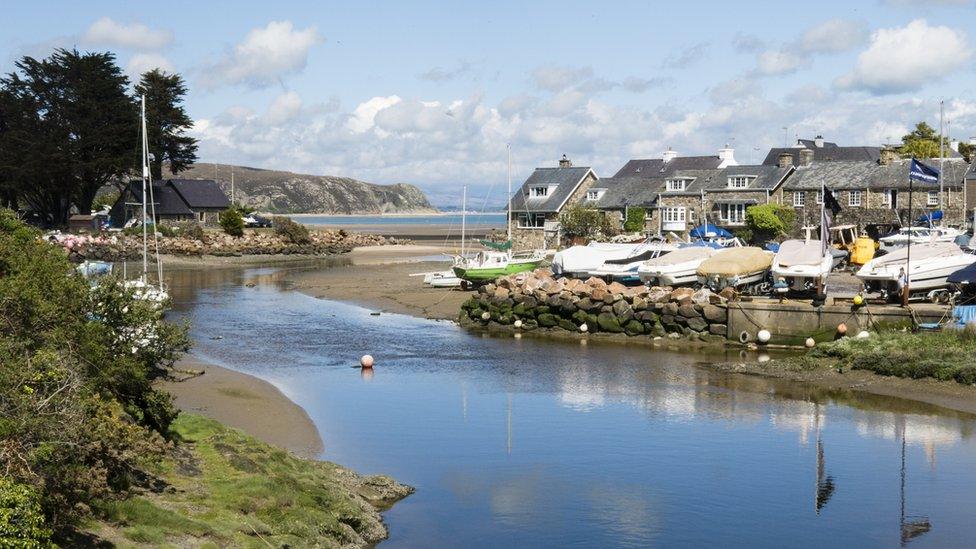Wales council tax: Extending homes could trigger bigger bills
- Published
- comments
"The lower income that you get, the less council tax you should pay"
An overhaul to council tax in Wales could see homeowners who extend their properties facing larger bills.
The Welsh government is launching a consultation on the first council tax revaluation in 20 years.
But officials are also asking if properties that increase in value after they are adapted should move up a tax band.
Labour ministers say the proposals would make council tax fairer.
But the Federation of Master Builders warned the proposals, if implemented, would "punish" people for whom extending their home is the only affordable option to get extra space.
The Welsh government set out on Tuesday how it plans to reform council tax, which critics say is out of date because it is based on old property values, and does not fairly tax people on lower incomes.
Under the plans the council tax bands assigned to Wales' 1.5m residential properties will be reassessed using property values from 1 April next year.
The exercise - part of Labour minister's deal with Plaid Cymru - could cost around £10m over three years, with new tax rates coming into effect in April 2025.
Welsh Liberal Democrat leader Jane Dodds said the reform proposals do not go far enough, while the Tories warned people must not face a "financial cliff edge" from the changes.
As part of the consultation, officials are considering whether homes should be placed in a different band if significant physical improvements, such as building an extension, changes their value.
Currently in Wales improved properties only move bands once they are sold.
However, under the Northern Ireland rates system, people are encouraged flag up alterations to their property that could cause it to be revalued.
The Federation of Master Builders warned the plans would "likely lead to fewer home improvement projects".
"Not enough homes are being built to meet the need and therefore extending is often the only affordable option to many who require additional space. It feels unfair to punish them for it," a spokeswoman said. Officials say some argue the current system can lead to unfairness between properties that have been sold and those that have not.
Economy Minister Vaughan Gething stressed at a press conference that no decision has been made: "That's an open question, and its a deliberate question."
"If you want the system to be fair, and part of it is still going to reflect property values, you need to think about the way in which properties are altered during their lifetime", he said.

The last council tax revaluation in Wales was undertaken in 2003
How does council tax work?
Council tax raises more than £2bn of the £10bn annual cost of Welsh local government, with most funding going to education and social services.
The amount you pay depends on the value of your home, based on a valuation exercise last done in 2003.
Homes are graded into a bands from A to I. Band A homes - valued at less than £44,000 - pay the least council tax, and homes in band I - valued at more than £424,000 - pay the most.
There are more homes in band C in Wales (valued from £65,001 - £91,000) than any other band.
The Welsh government says the tax bands no longer represent current house values.
Currently band I properties pay three and a half times as much as band A, yet homes in the top band can be worth at least nine times as much.
Until the 2023 revaluation is done it will not be known how many would lose or benefit from the changes.
A 2019 paper by the Institute for Fiscal Studies (IFS) estimated that a revaluation based on the current system could see 26% go down a band, and 26% go up, with 49% remaining the same.
What else is in the reforms?
More bands could also be added at the top and bottom of the range, and a system of rolling revaluations could be implemented every five years.
Ministers are looking at reviewing the list of council tax exemptions, and whether to make changes to the council tax reduction scheme.
The last revaluation exercise saw a third of homes hit with higher bills, external, but Rebecca Evans, finance and local government minister, says the reforms are not intended to raise more cash.
"While some people could pay more, many others would pay less," she said.
Ministers will look at implementing transitional measures - potentially allowing higher bills to be phased in.
"Council tax pays for essential local services we all rely on, but the way it is currently charged has a disproportionate impact on less affluent people," Ms Evans added.


Council tax reform is sensitive and difficult, which is why no politician has touched it for 20 years.
The danger with these proposals is that they please no one.
Those who want the current system scrapped are criticising an approach that they think merely mitigates an unfair system.
While any tax payers who end up facing bigger council tax bills will inevitably be unhappy.
And with a proposed timetable of implementation in the year before the next Senedd elections, there may be some candidates who will find it a little uncomfortable on the doorstep.

Only a quarter of people surveyed believed their council tax was 'about right'

What are people's attitudes to council tax?
47% agreed that their council tax bill reflects the current value of their home.
Around six out of 10 people (62%) disagreed that they had seen the benefit of council tax invested in their local community.
Over half of respondents (57%) disagreed with the statement that the council tax system was fair.
Around three-fifths of respondents (61%) indicated that their council tax was too high and 42% wanted council tax replaced
These responses were in a survey of 1,000 adults in Wales in February and March 2022., external, in a research paper for the Welsh government.
'Cliff edge'
The Welsh government consultation does not look at alternatives to council tax, which the IFS has called "out of date, regressive and distortionary".
It has argued for a system where taxes were pegged to estimated property values, rather than a band.
Officials say they will continue to explore alternatives.
First Minister Mark Drakeford believes land value taxation is fairer but said it could take a decade to bring in. Plaid has also promised to bring forward land tax proposals to replace business rates initially, and council tax later.
Luke Young, from Citizens Advice Cymru, urged more radical changes, with the charity seeing more people seeking help for council tax debt.
He said: "The Welsh government must not miss this once-in-a-generation opportunity to transform Wales' council tax system into a progressive tax based on income and ability to pay."
Welsh Liberal Democrat leader Jane Dodds said the proposals "don't seem to bring us any closer to the systemic changes needed".
Conservative local government spokesman Sam Rowlands welcomed the consultation, and said it was important that any change led to a fair transition for council taxpayers, and would not force anyone to fall off a "financial cliff edge".
Plaid's Cefin Campbell said the proposals "are the first step in changing the council tax system which could make a real difference, by making the system fairer".

SAM SMITH PRESENTS STORIES OF HIV: From Terrence Higgins to today
BORN DEAF, RAISED HEARING: What it means to live in two different worlds

Related topics
- Published7 December 2021

- Published9 July 2022

- Published16 June 2022

- Published23 November 2021
